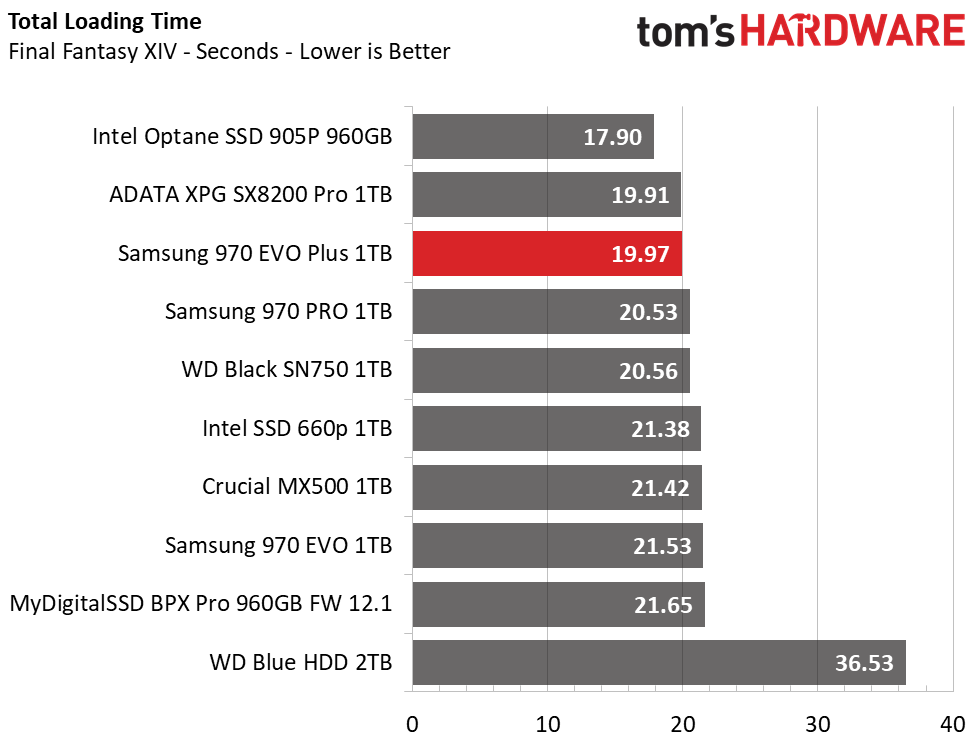Samsung 970 EVO Plus SSD Review: More Layers Brings More Performance
Why you can trust Tom's Hardware
1TB Performance Results
Comparison Products
We put Samsung’s 1TB 970 EVO Plus up against the new WD Black SN750, Adata’s newest SX8200 Pro, MyDigitalSSD’s BPX Pro with updated 12.1 firmware, and Intel's QLC-powered 660P. We also threw in the Samsung 970 PRO as an example of a top-performing SSD, while the Crucial MX500 slots in as a low-cost SATA comparable.
Trace Testing – PCMark 8 Storage Test 2.0
PCMark 8 is a trace-based benchmark that uses Microsoft Office, Adobe Creative Suite, World of Warcraft, and Battlefield 3 to measure the performance of storage devices in real-world scenarios.
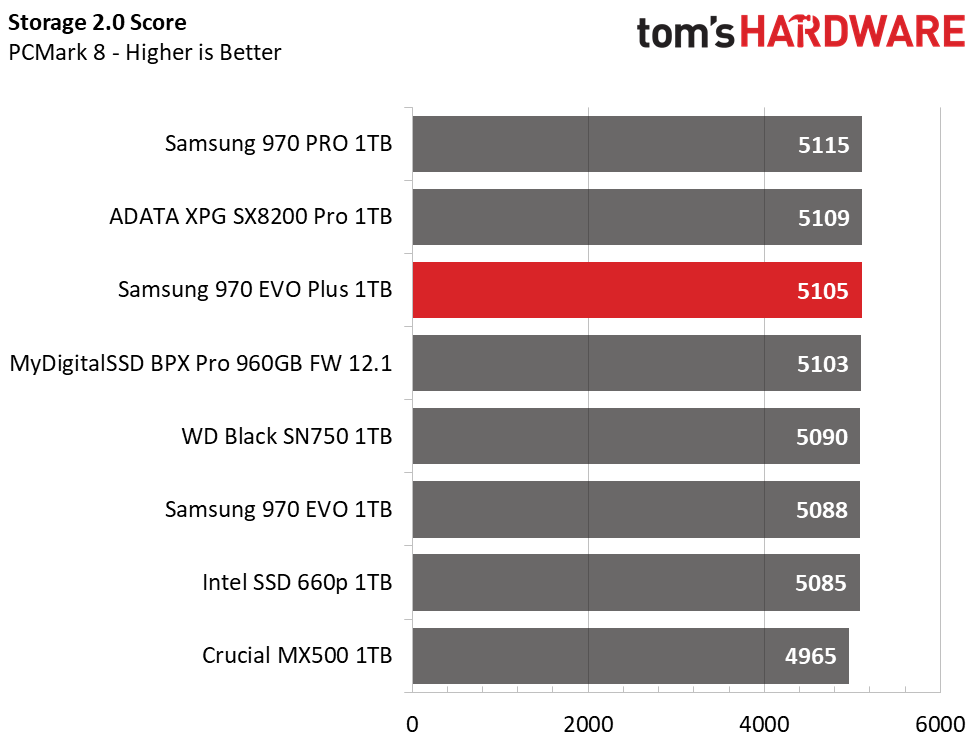
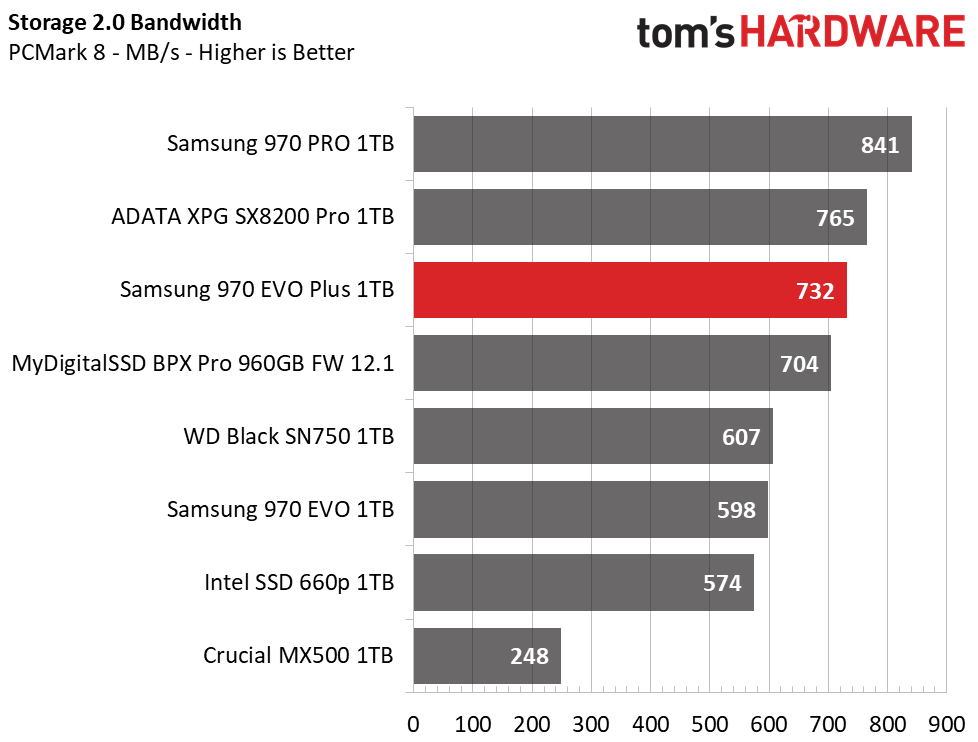
The 970 EVO Plus lands it third place overall, just behind the new Adata XPG SX8200 Pro and the Samsung 970 PRO. Again, the 970 EVO Plus destroys the non-Plus model and even surpasses the Phison E12-powered BPX Pro.
Game Scene Loading - Final Fantasy XIV
The Final Fantasy XIV StormBlood benchmark is a free real-world game benchmark that easily and accurately compares game load times without the inaccuracy of using a stopwatch.
The 970 EVO Plus outperforms the 970 PRO by half a second and the 970 EVO by a full 1.5 seconds. It ranks third overall when compared to Intel’s Optane 905P, landing just milliseconds behind the XPG SX8200 Pro.
Transfer Rates – DiskBench
We use the DiskBench storage benchmarking tool to test file transfer performance with our own custom 50GB block of data. Our data set includes 31,227 files of various types, like pictures, PDFs, and videos. We copy the files to a new folder and then follow up with a read test of a newly-written 6 GB file.
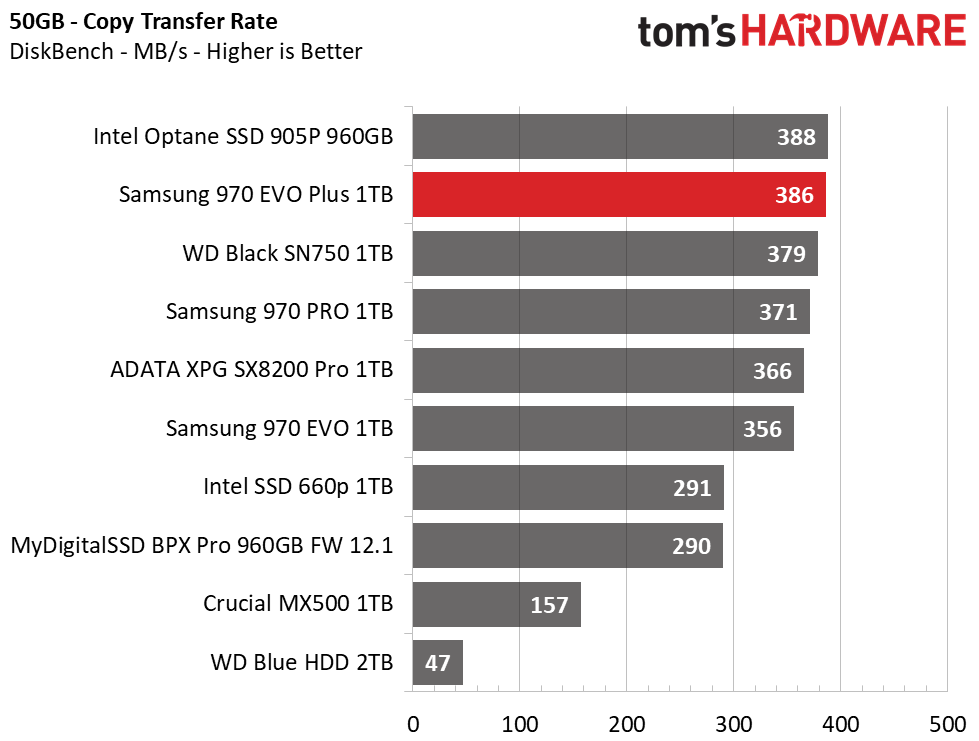
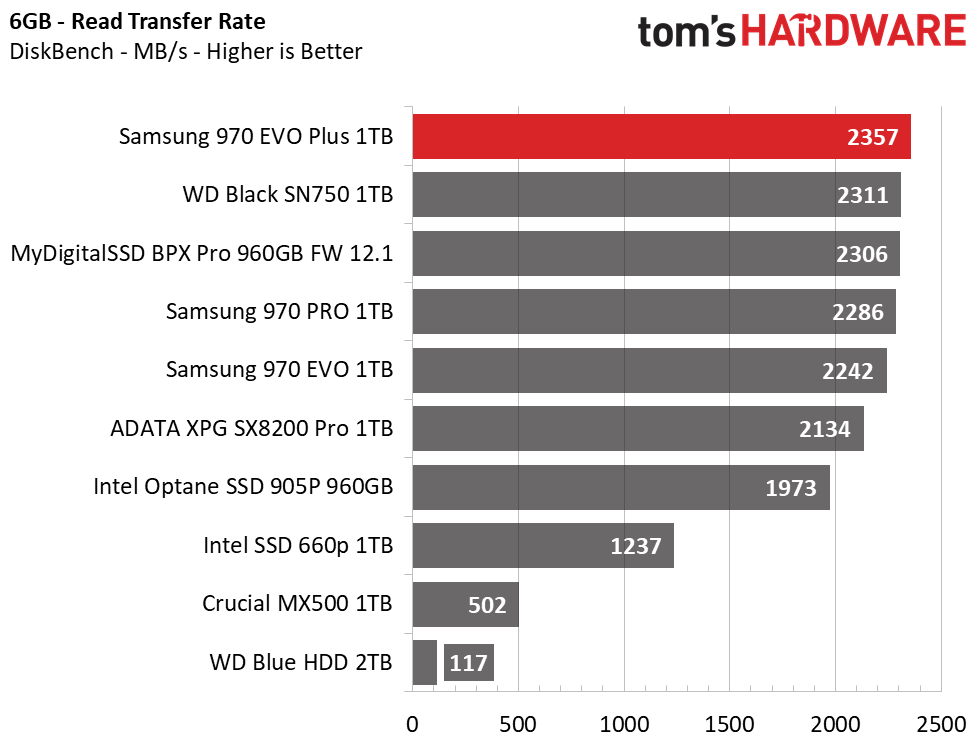
With over 3.5GB/s read and 3.3GB/s write on tap, Samsung’s 970 EVO Plus nearly takes first place from the Optane 905P and delivers the fastest copy result of any NAND-based SSD we’ve tested. It also takes first place during the file read test.
Get Tom's Hardware's best news and in-depth reviews, straight to your inbox.
SYSmark 2014 SE
Like PCMark, SYSmark uses real applications to measure system performance. SYSmark takes things much further, however. It utilizes fourteen different applications to run real workloads with real data sets to measure how overall system performance impacts the user experience. BAPCo's SYSmark 2014 SE installs a full suite of applications for its tests, which includes Microsoft Office, Google Chrome, Corel WinZip, several Adobe software applications, and GIMP. That also makes it a great test to measure the amount of time it takes to install widely-used programs after you install a fresh operating system.
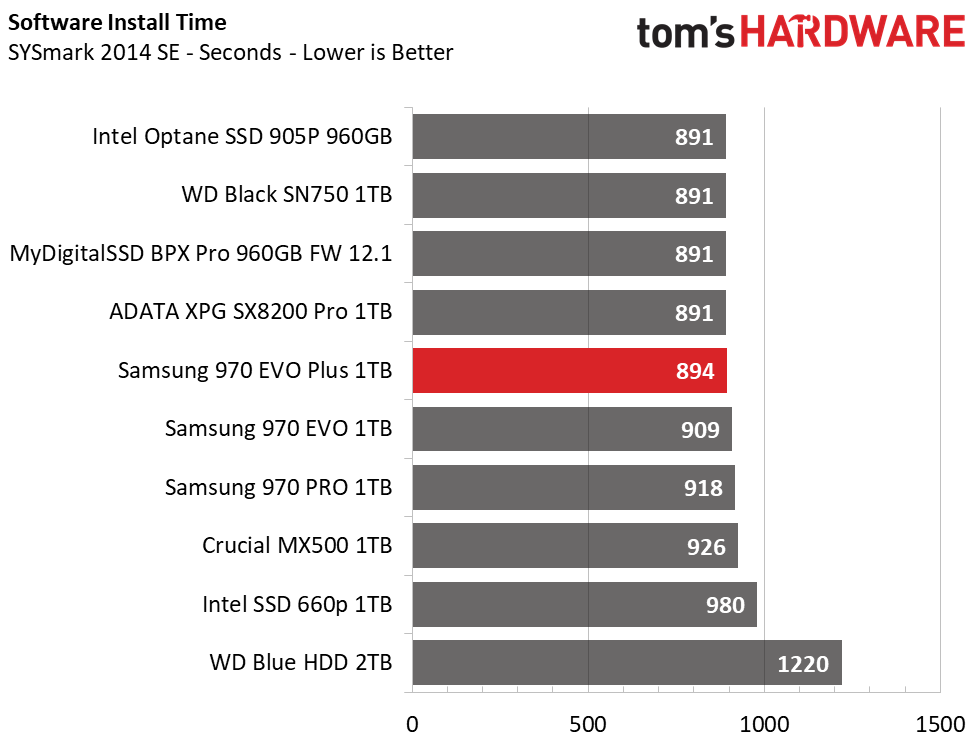
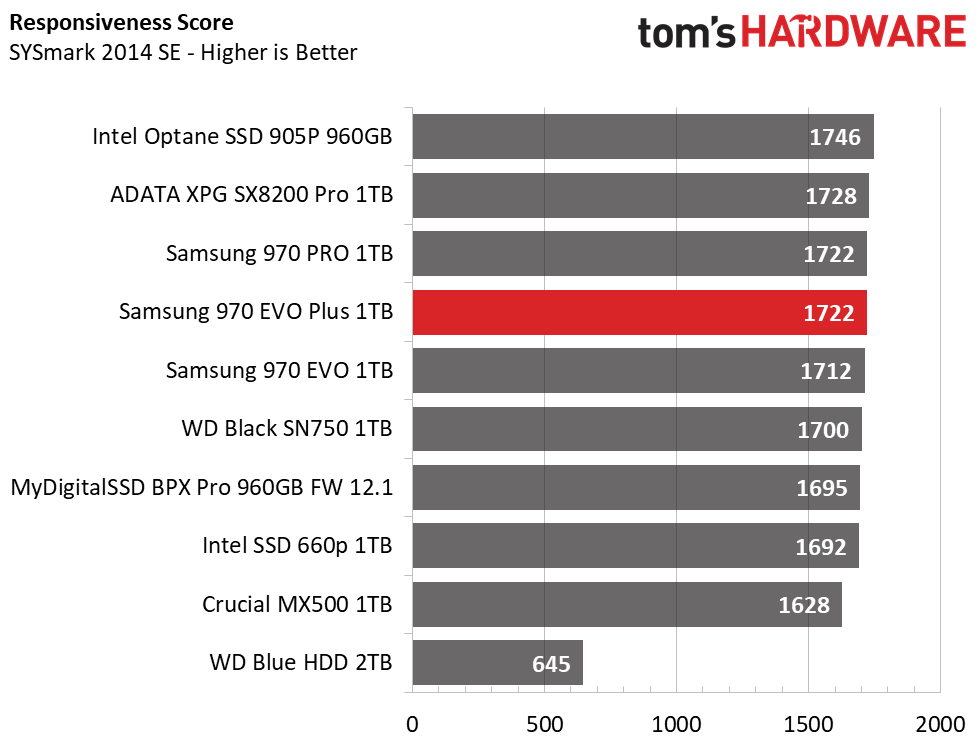
Once again, the 970 EVO Plus installs SYSmark in 894 seconds. It lands in fifth place behind the Intel 905P, WD Black SN750, MyDigitalSSD BPX Pro, and Adata SX8200 Pro, all of which tie for first with a three-second advantage.
ATTO
ATTO is a simple and free application that SSD vendors commonly use to assign sequential performance specifications to their products. It also gives us insight into how the device handles different file sizes.
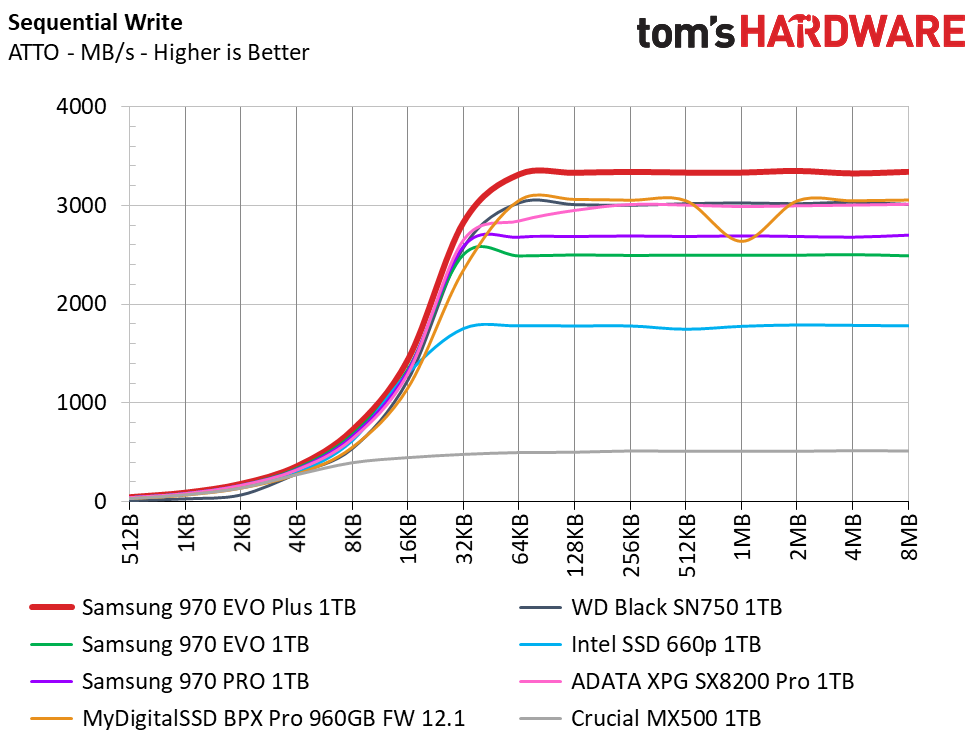
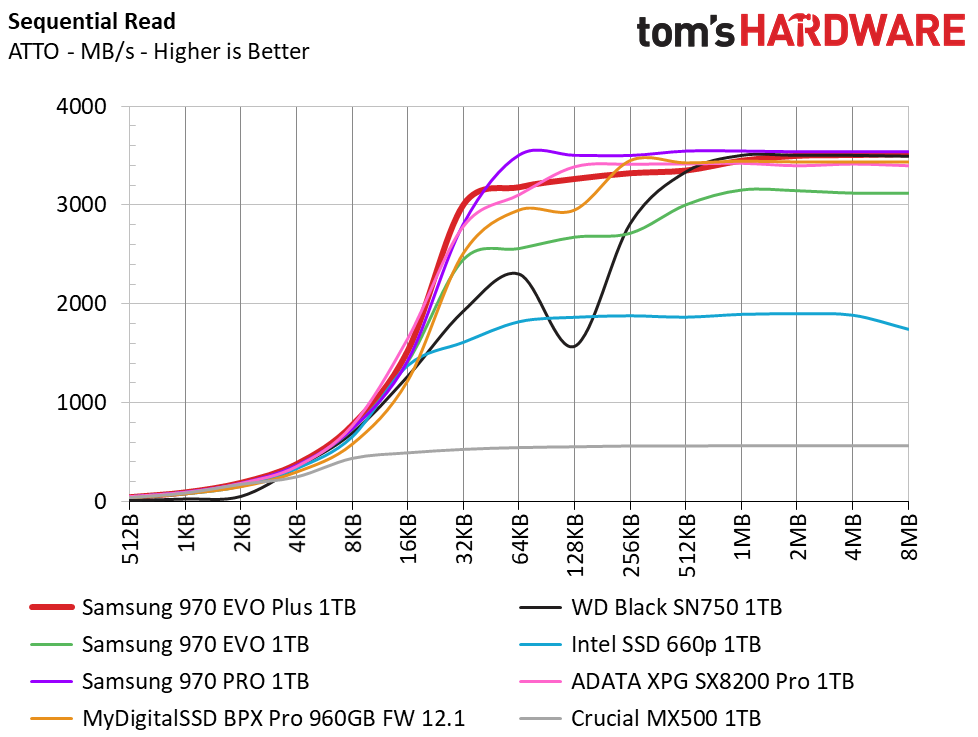
The EVO Plus's sequential write performance goes unrivaled once again, but read performance could use a bit of improvement to match the PRO model in some of the file sizes. Overall, the 1TB 970 EVO Plus hits its rated speeds of 3.5/3.3 GB/s read/write.
Anvil's Storage Utilities
Anvil's Storage Utility is a commonly-referenced benchmark that simplifies the complex IOMETER benchmark and its underlying Dynamo engine with a one-click software wrapper.
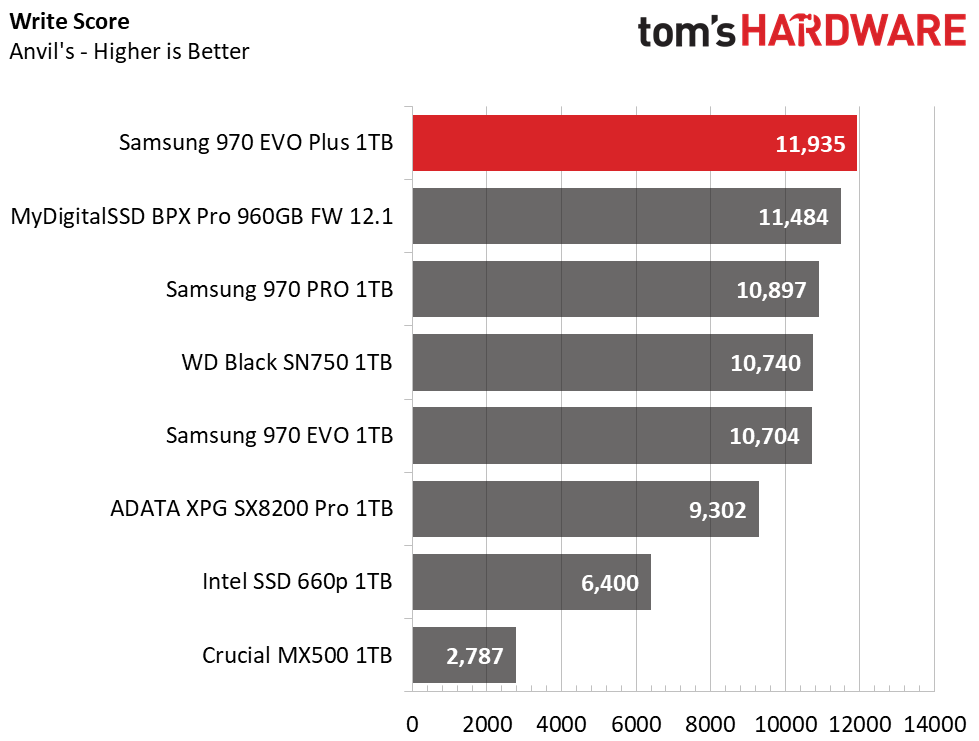
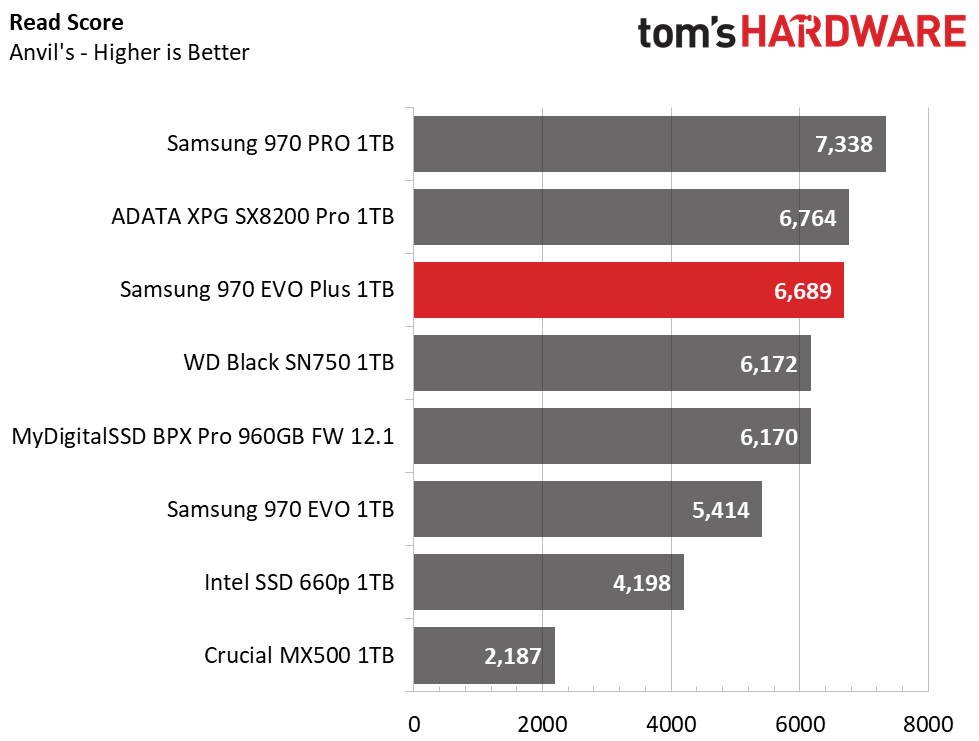
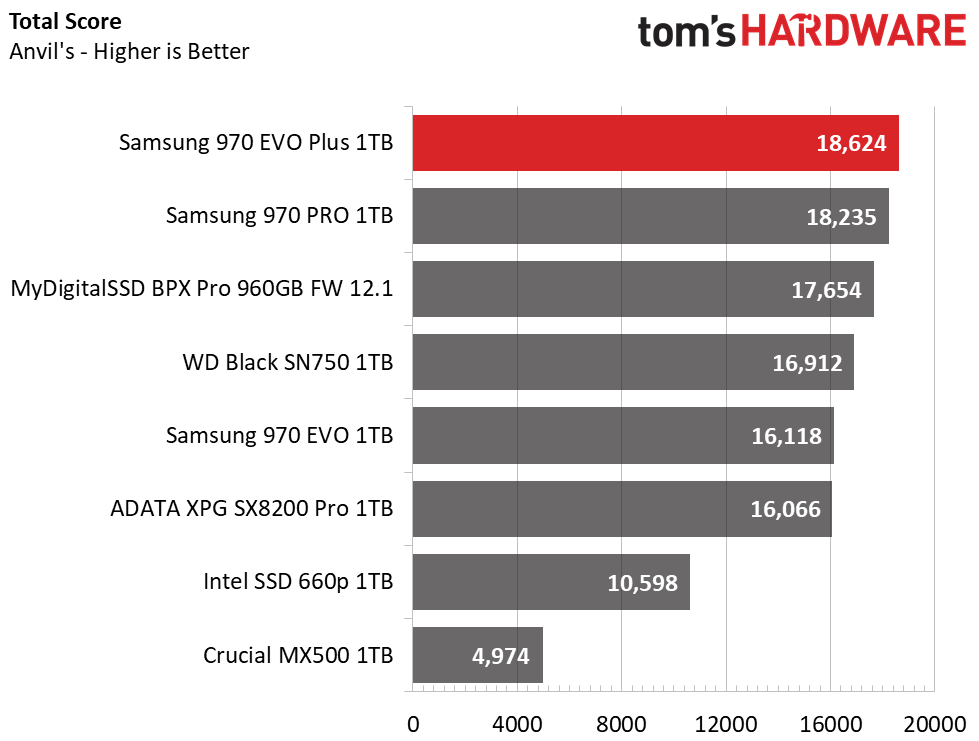
As with the 500GB model, the 1TB 970 EVO Plus takes first place overall on the strength of its performance during write workloads. Samsung’s 970 EVO Plus outperforms its predecessor by over 2,500 points.
CrystalDiskMark
CrystalDiskMark (CDM) is a simple and easy to use file size benchmarking tool.
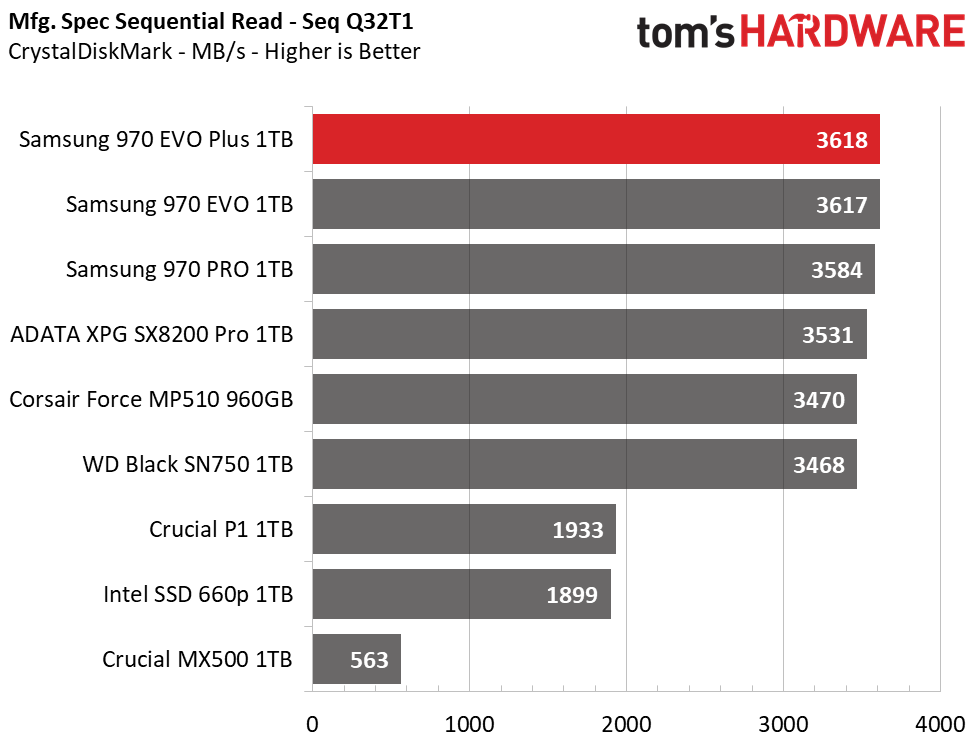
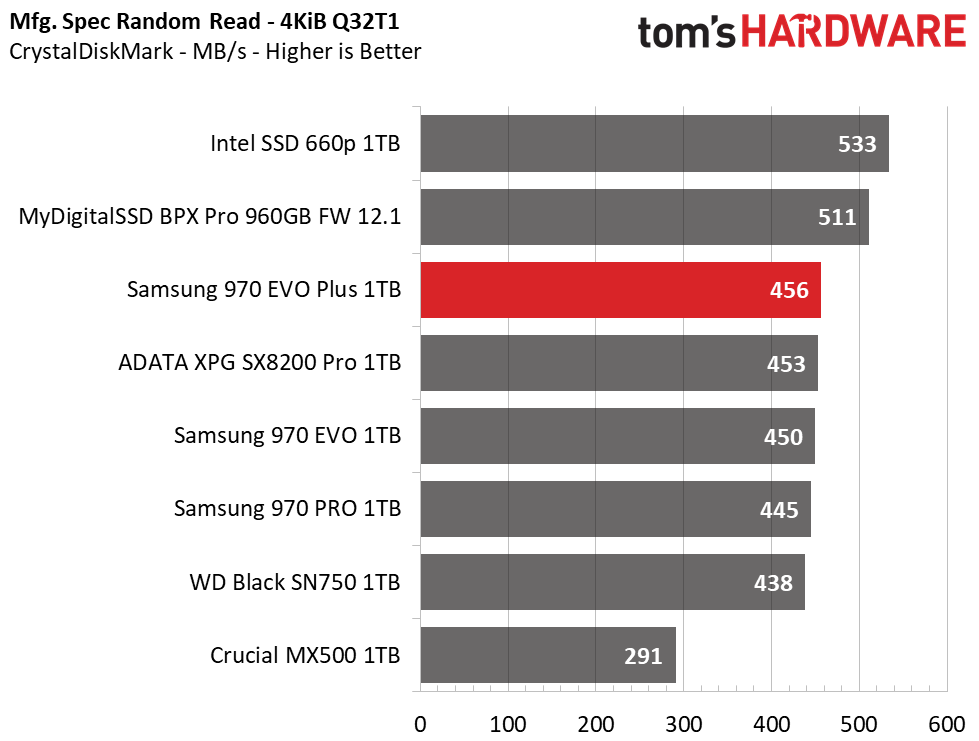
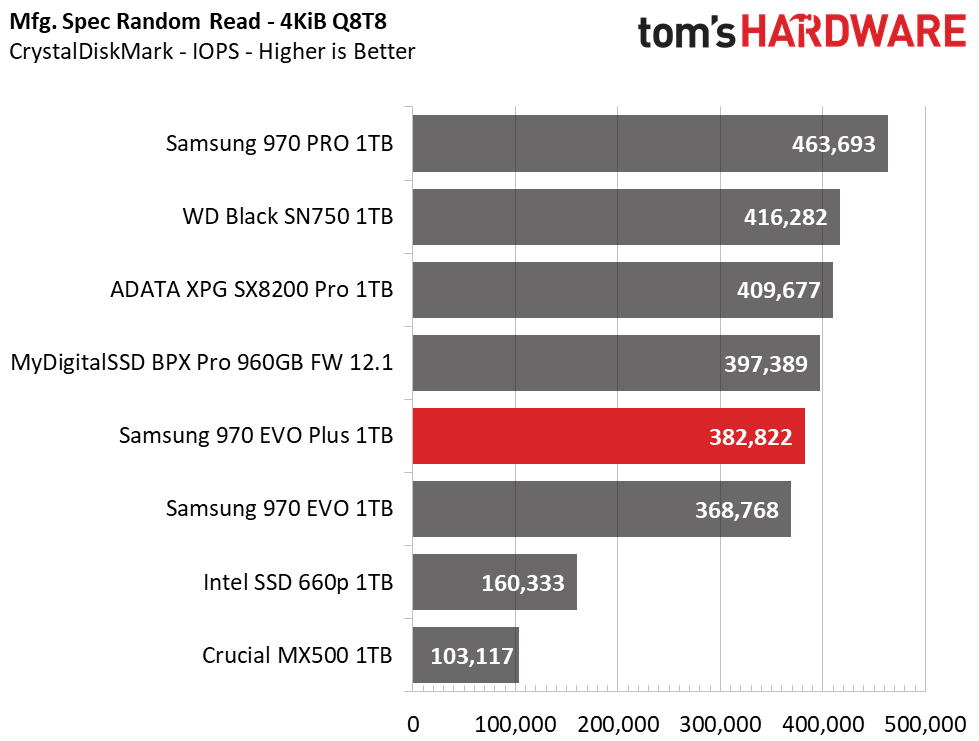
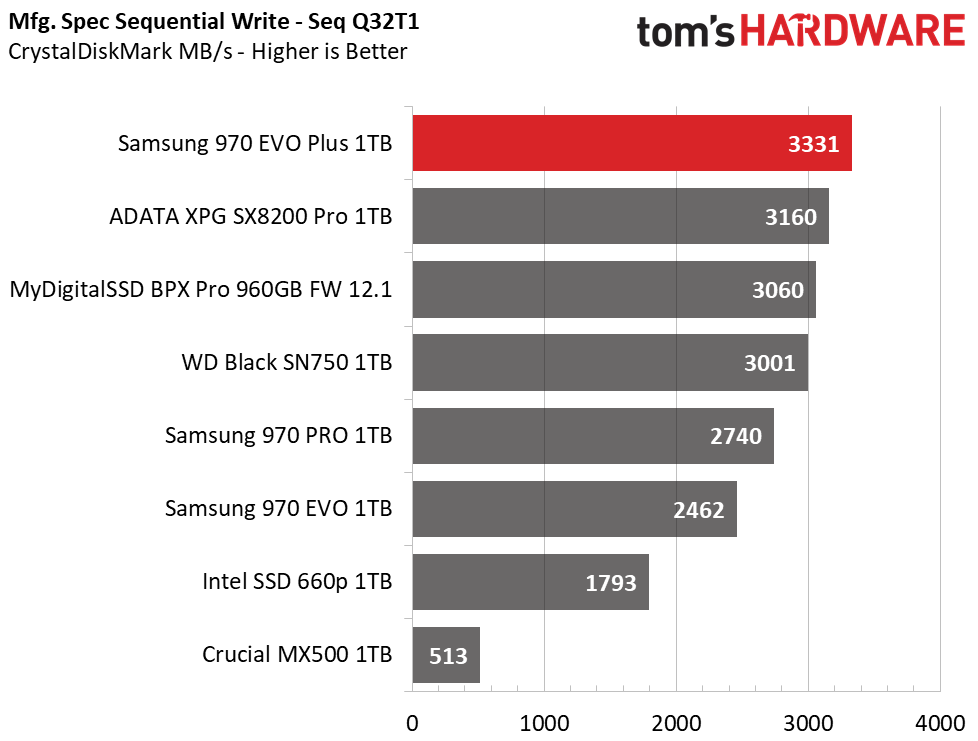
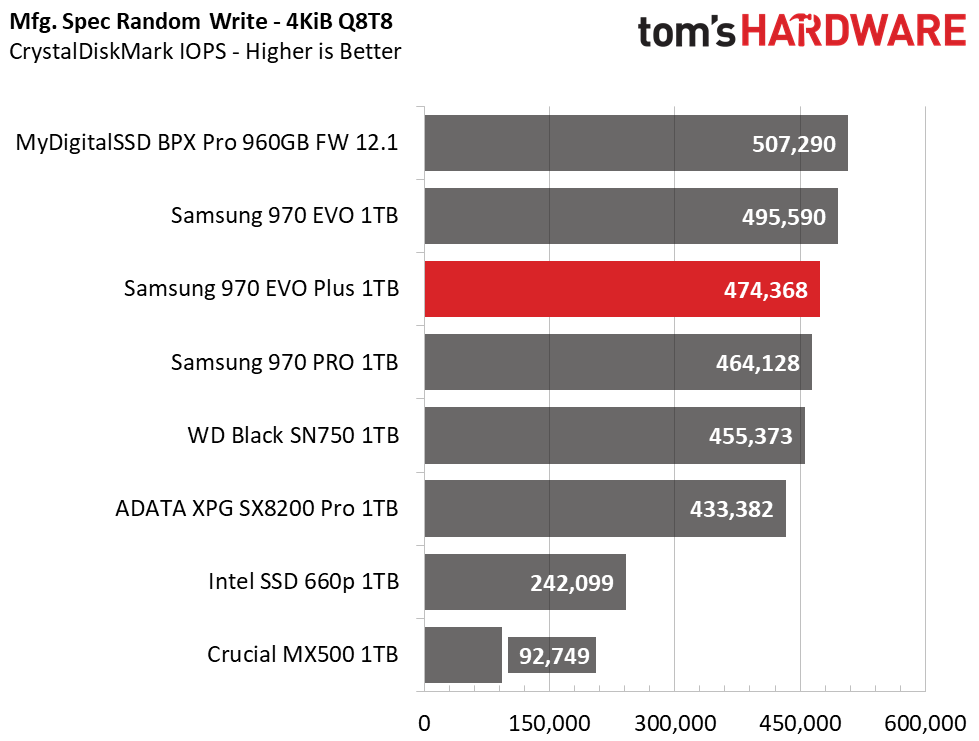
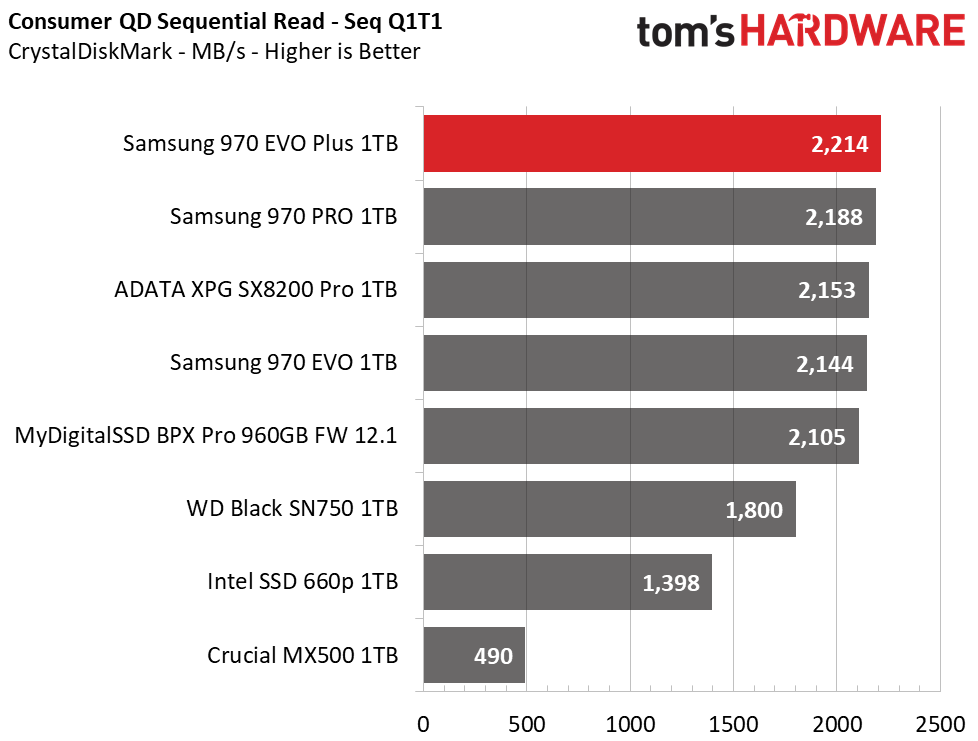
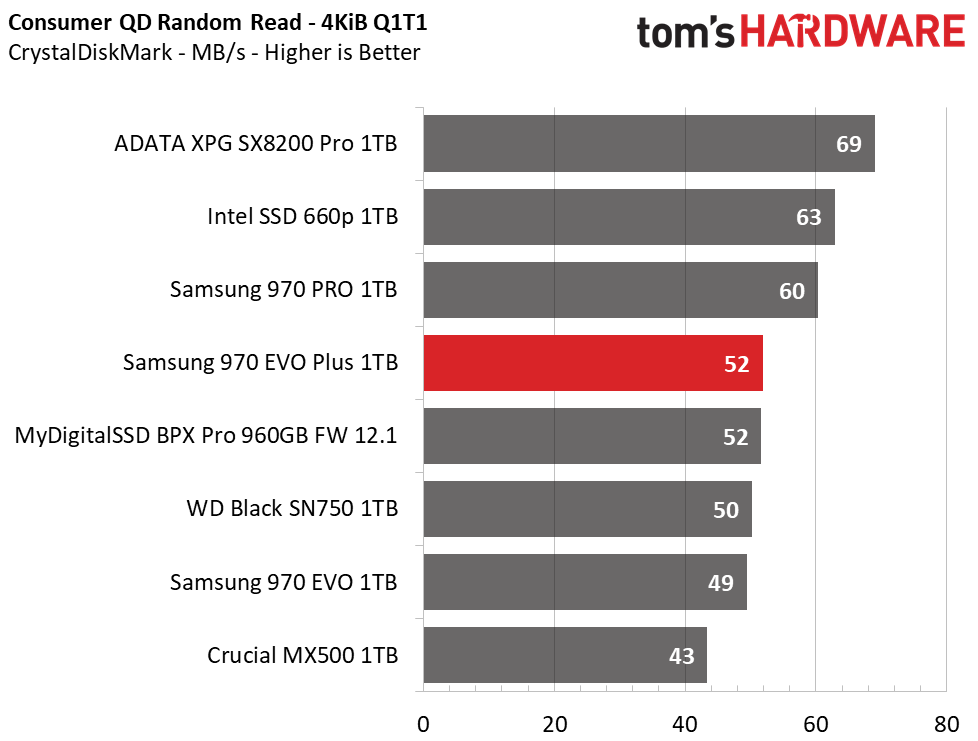
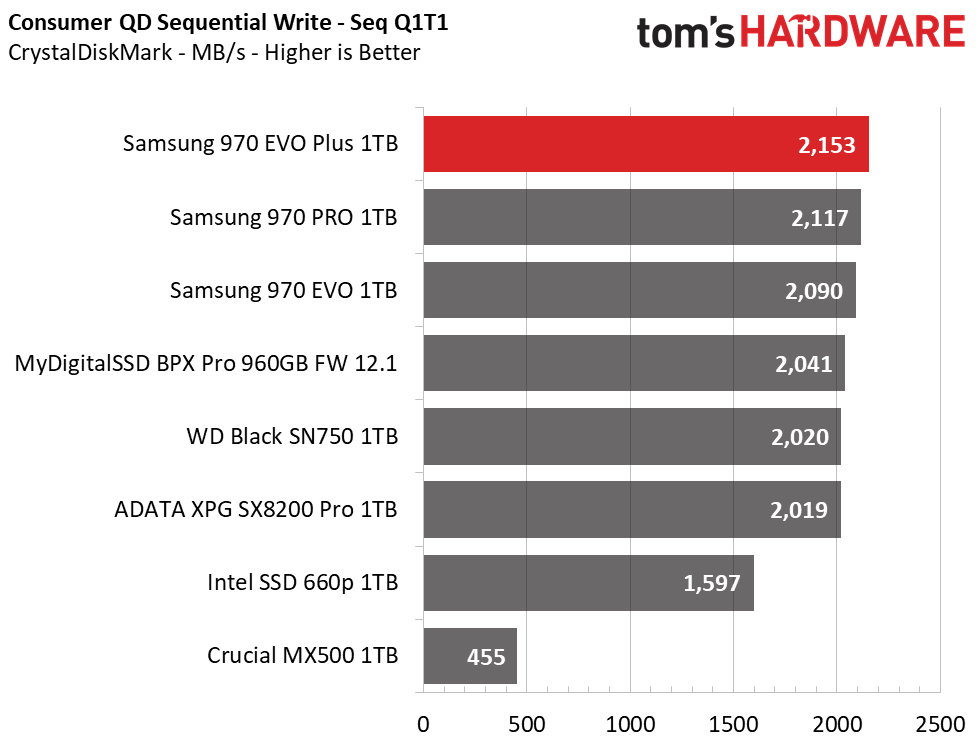
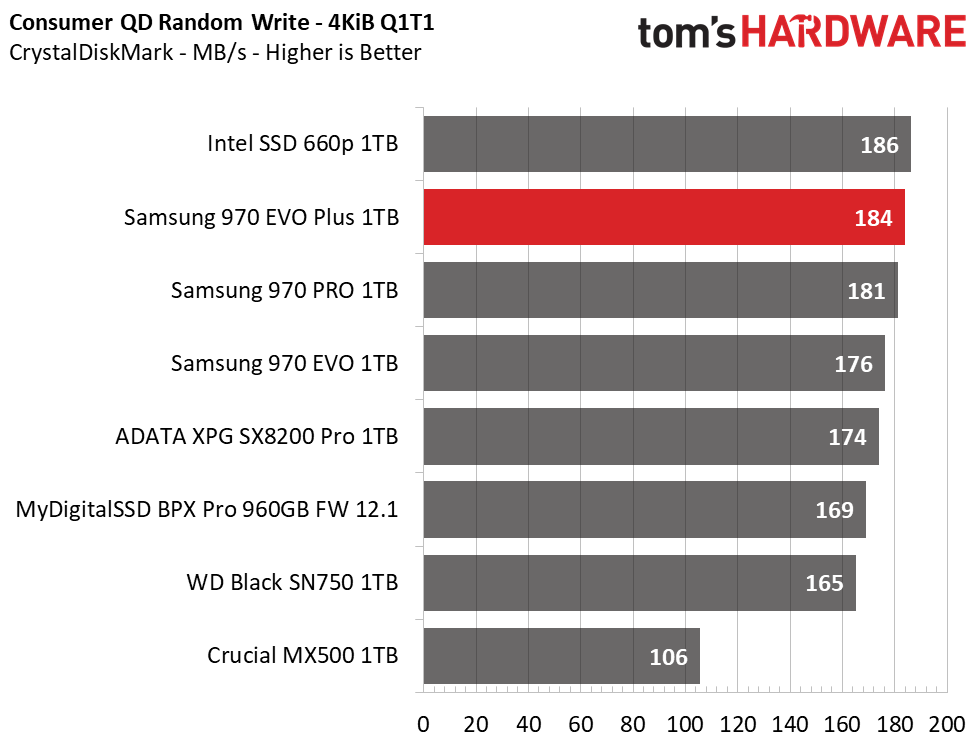
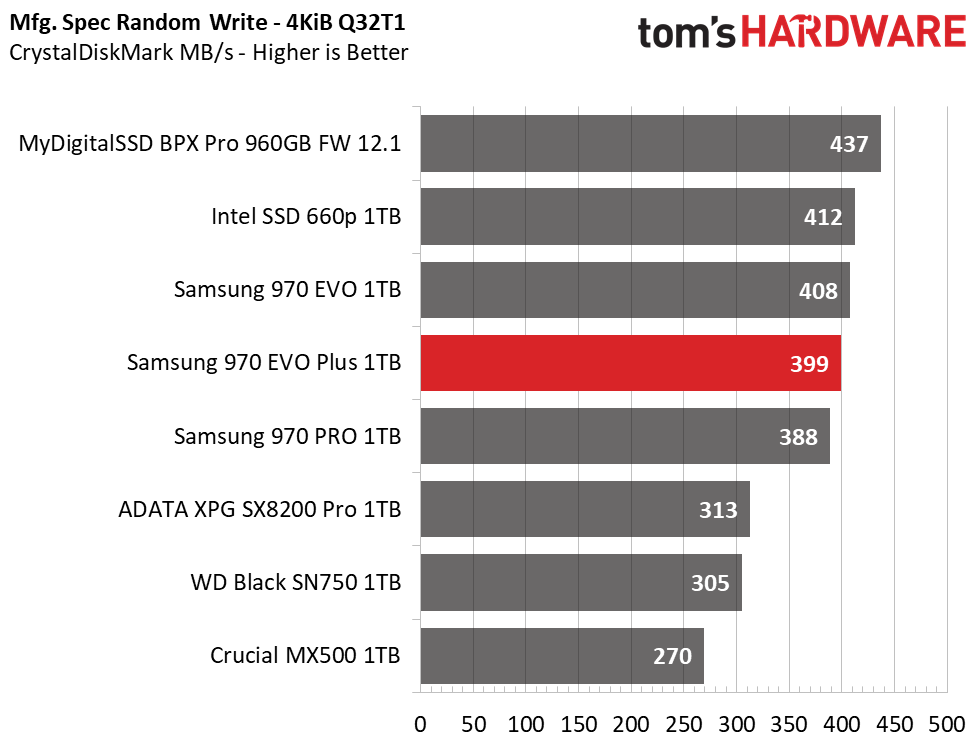
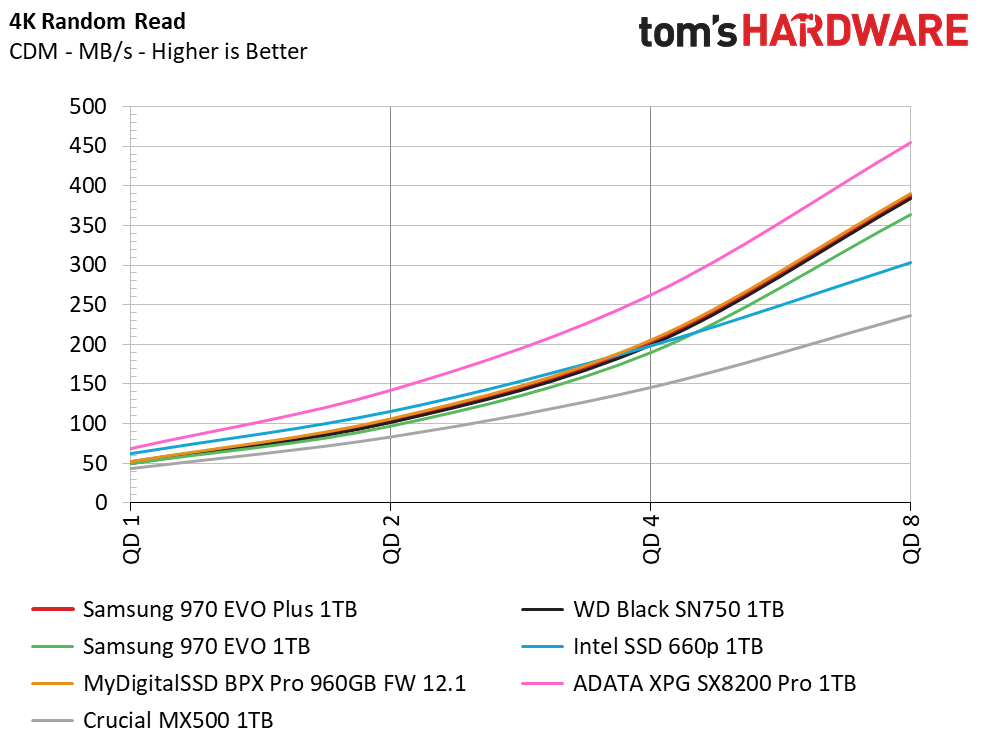
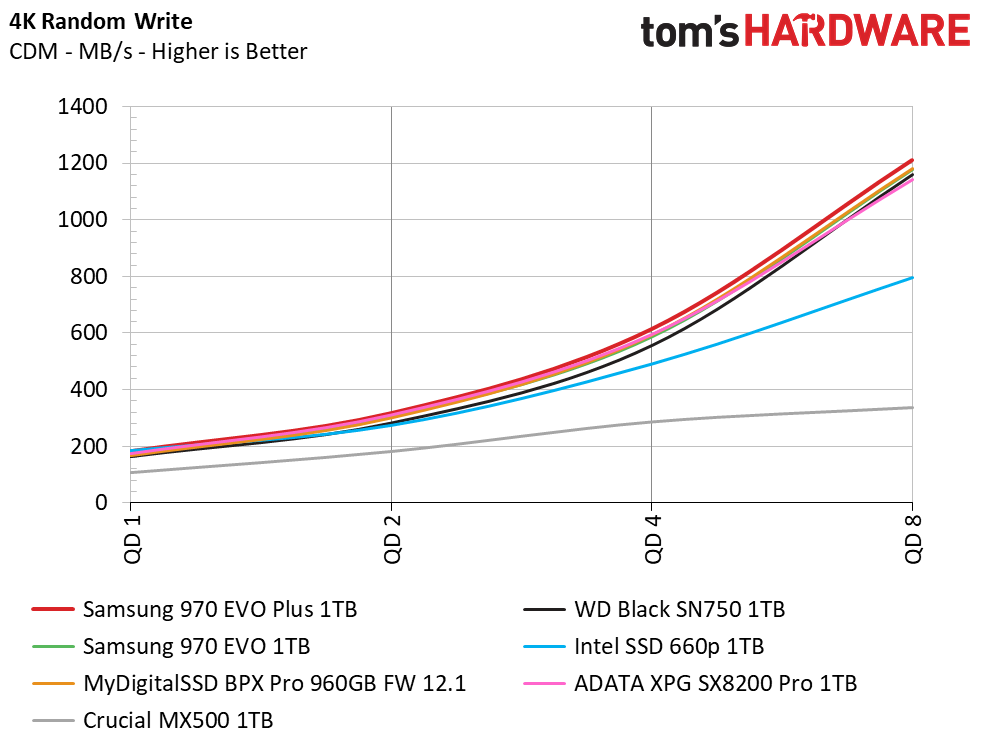
Sequential performance surpasses the 3.5/3.3GB/s read/write ratings as the 970 EVO Plus takes the overall lead.
At QD1, Samsung’s 970 EVO Plus leads the pack in sequential performance but lags behind the Silicon Motion-powered SSDs during the random read tests.
Sustained Sequential Write Performance
Official write specifications are only part of the performance picture. Most SSD makers implement an SLC cache buffer, which is a fast area of SLC-programmed flash that absorbs incoming data. Sustained write speeds can suffer tremendously once the workload spills outside of the SLC cache and into the "native" TLC or QLC flash. We hammer the SSDs with sequential writes for 15 minutes to measure both the size of the SLC buffer and performance after the buffer is saturated.
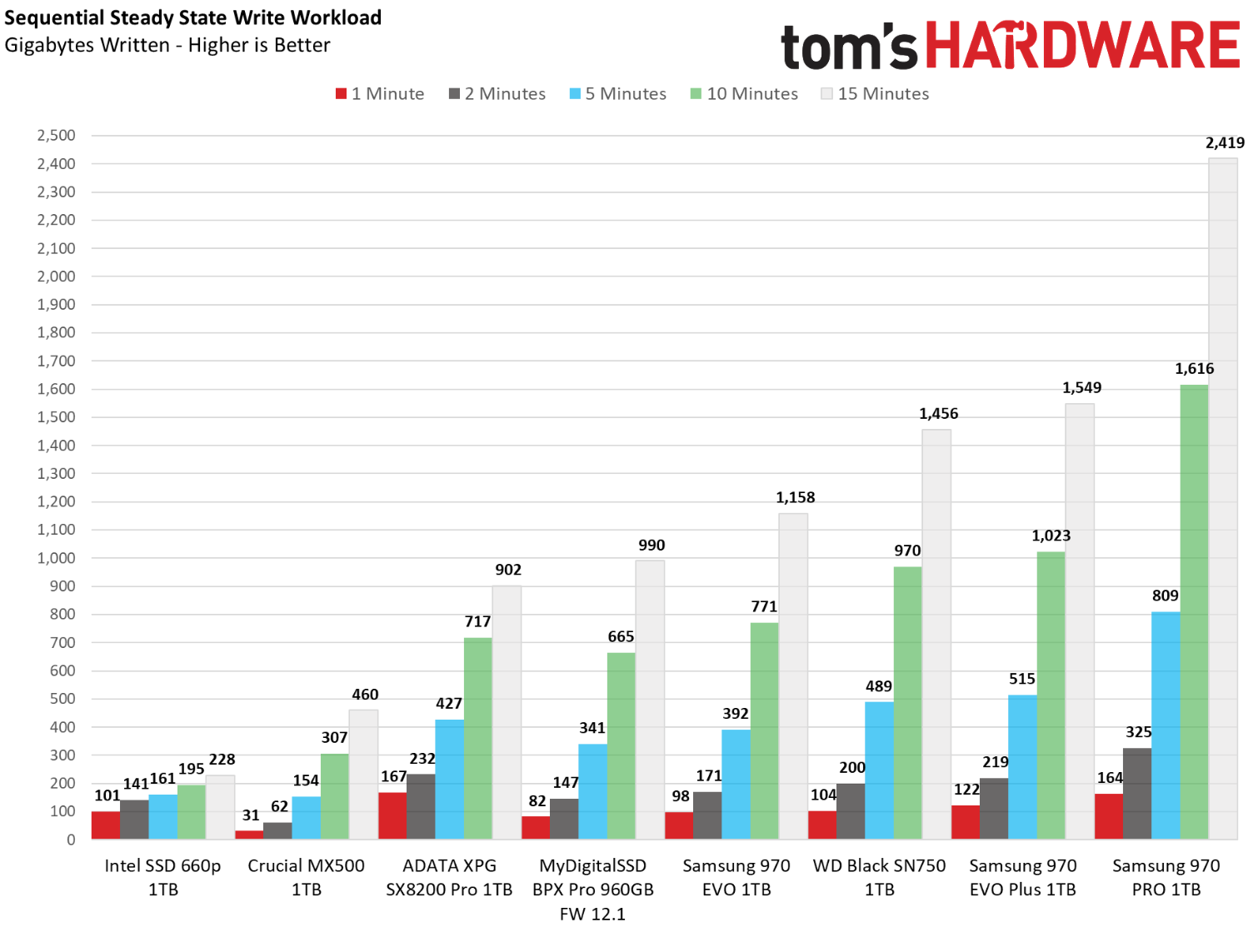
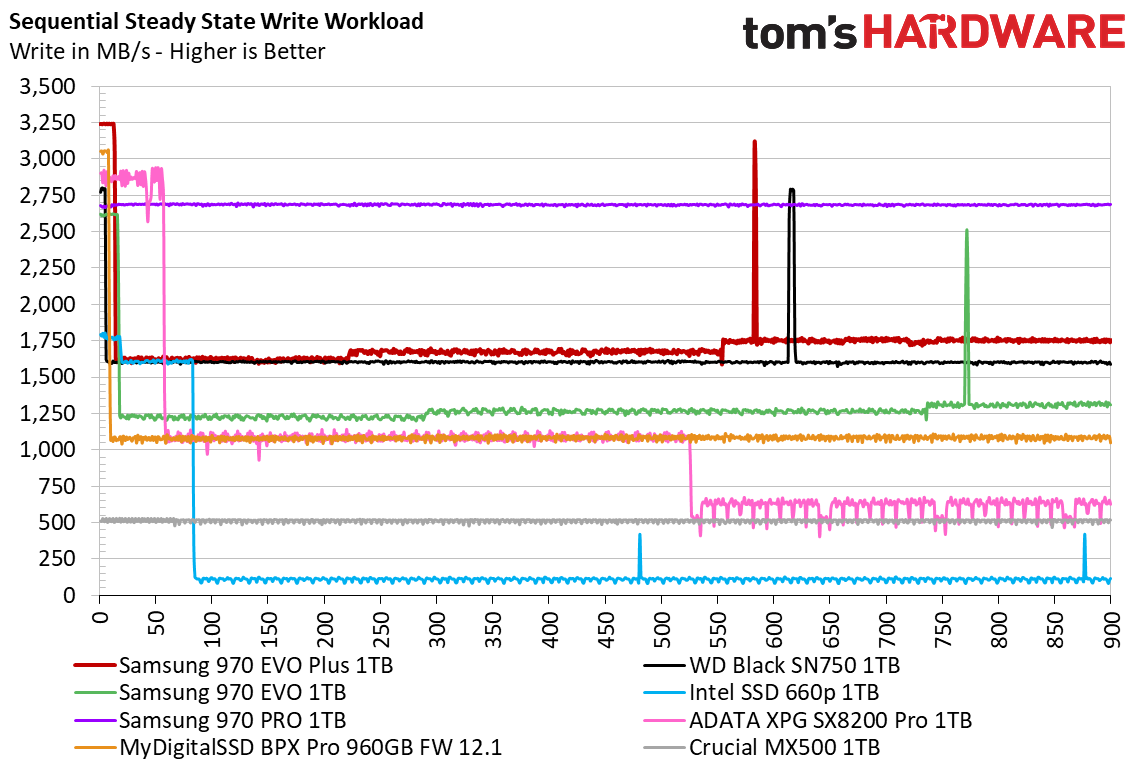
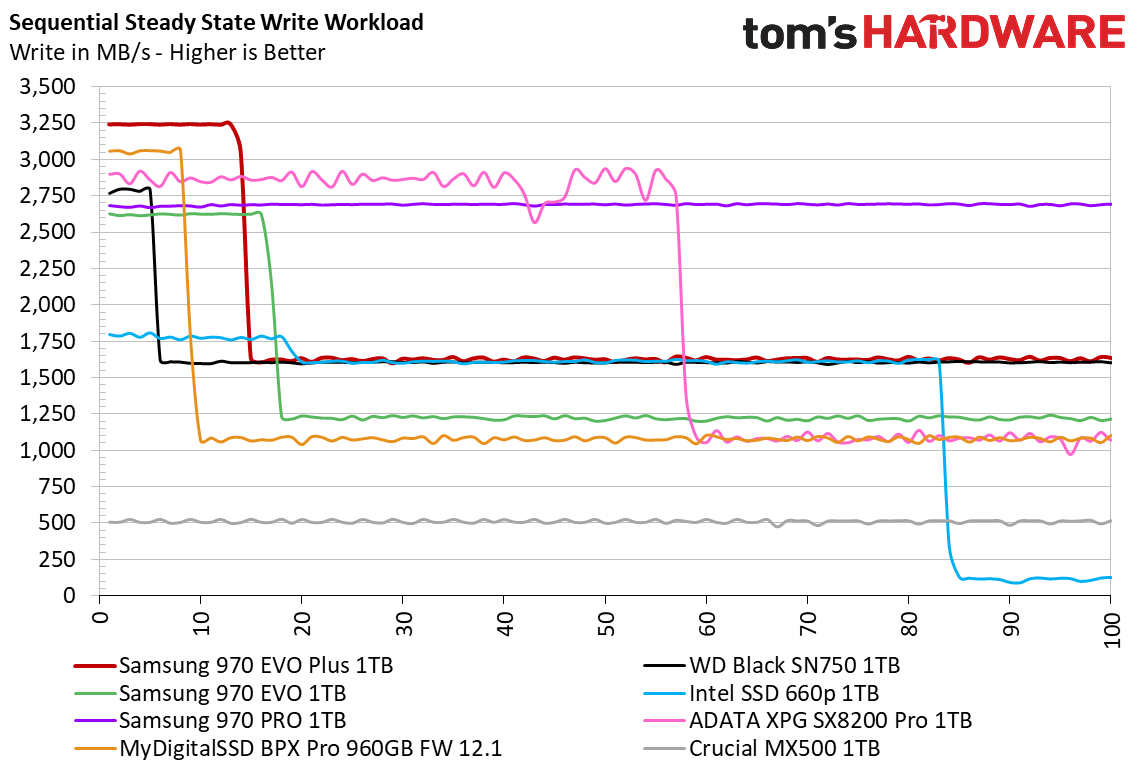
After we wrote 42GB of data to the drive its performance fell to an average of 1.7GB/s for the remainder of the test, which is right in line with the official specifications. Except for the 970 PRO, Samsung’s 970 EVO Plus wrote more data than the competing drives during the 15-minute write bombardment.
But that's only part of the picture. The Adata SX8200 Pro was actually faster up until the two-minute mark, writing 232GB of data while the 970 EVO Plus wrote 219GB. For typical consumer workloads, where read and write operations are done in short bursts, the SX8200 Pro proves to be a tough competitor.
Power Consumption
We use the Quarch HD Programmable Power Module to gain a deeper understanding of power characteristics. Idle power consumption is a very important aspect to consider, especially if you're looking for a new drive for your laptop. Some SSDs can consume watts of power at idle while better-suited ones sip just milliwatts. Average workload power consumption and max consumption are two other aspects of power consumption, but performance-per-watt is more important. A drive might consume more power during any given workload, but accomplishing a task faster allows the drive to drop into an idle state faster, which ultimately saves power.
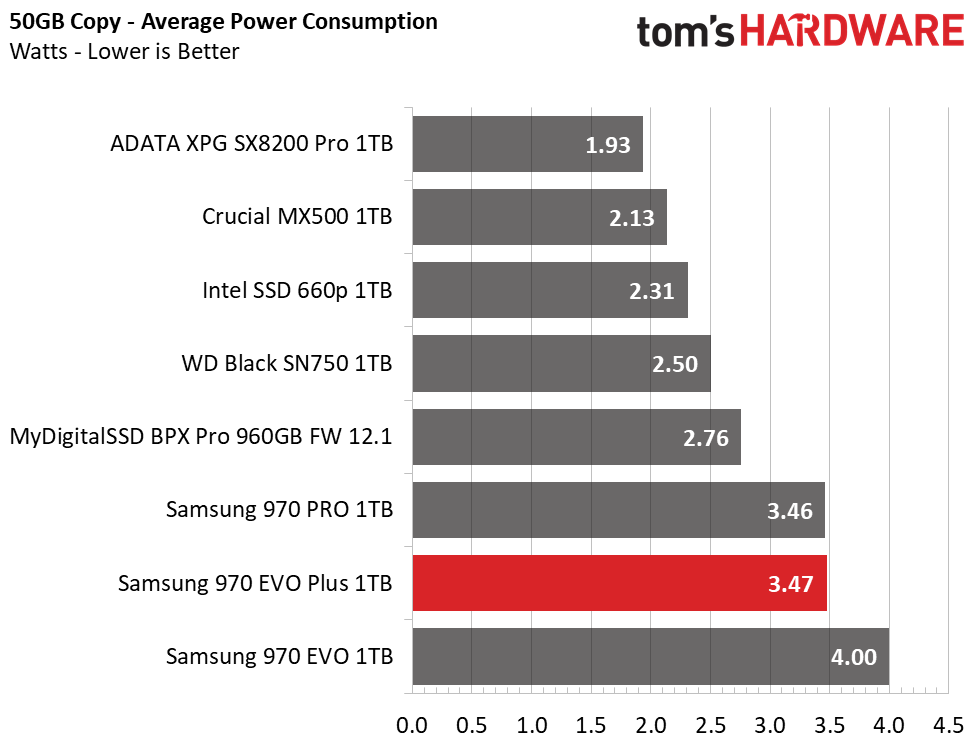
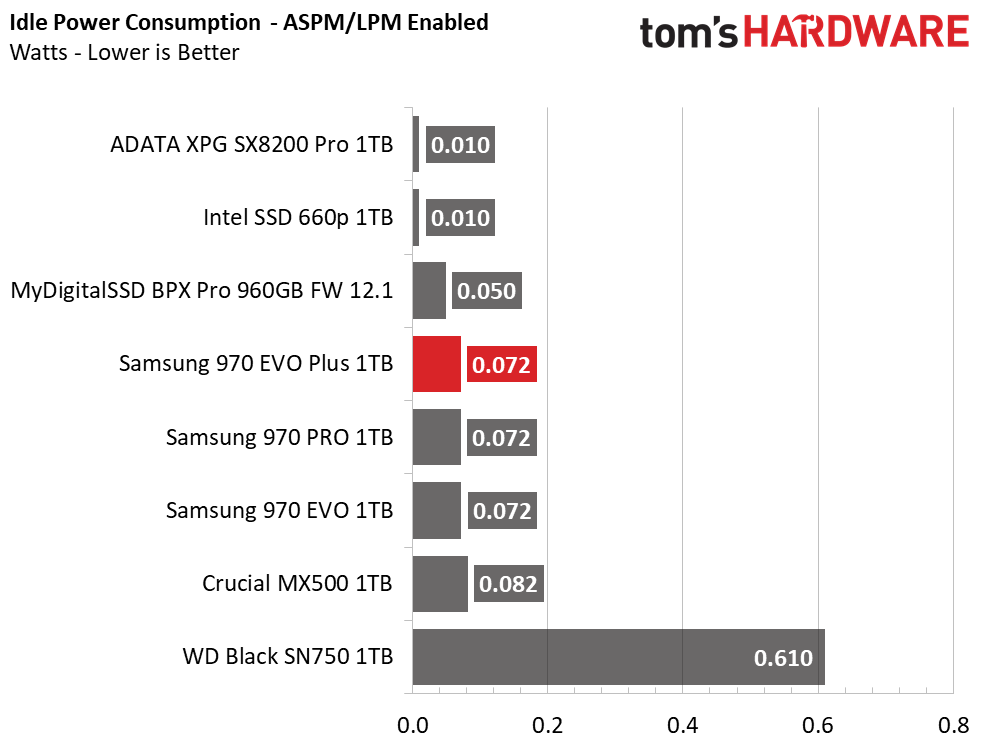
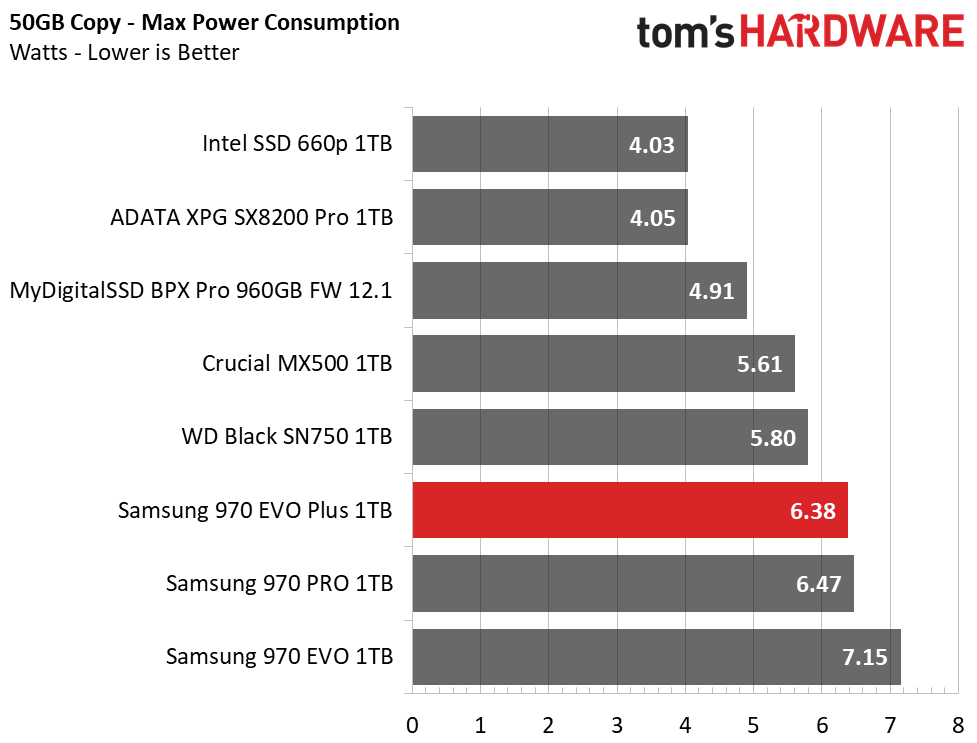
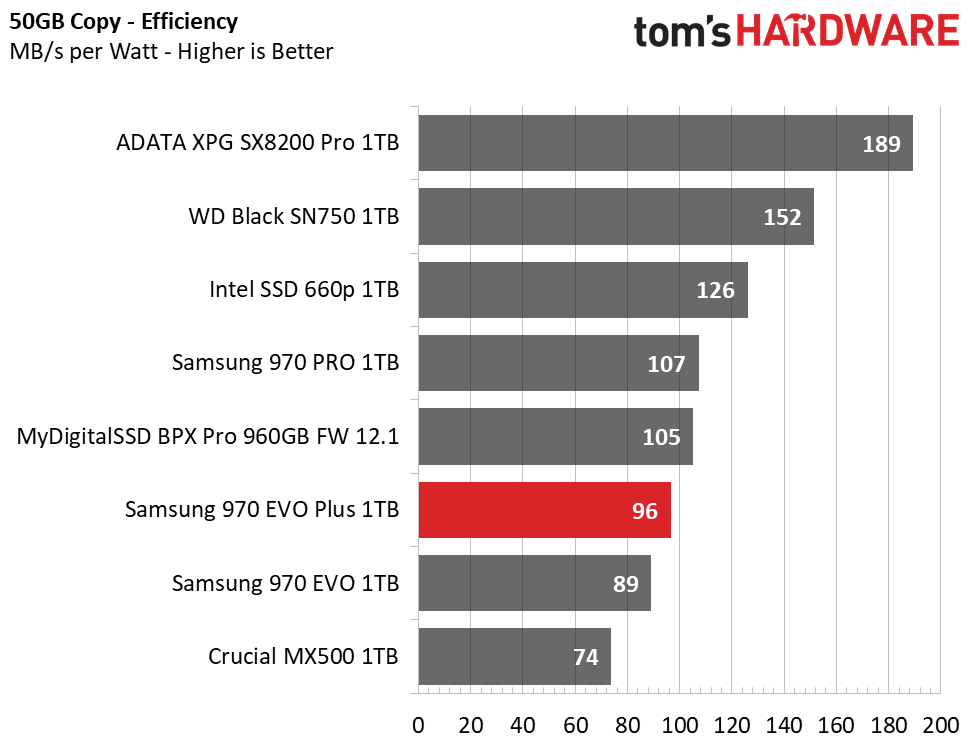
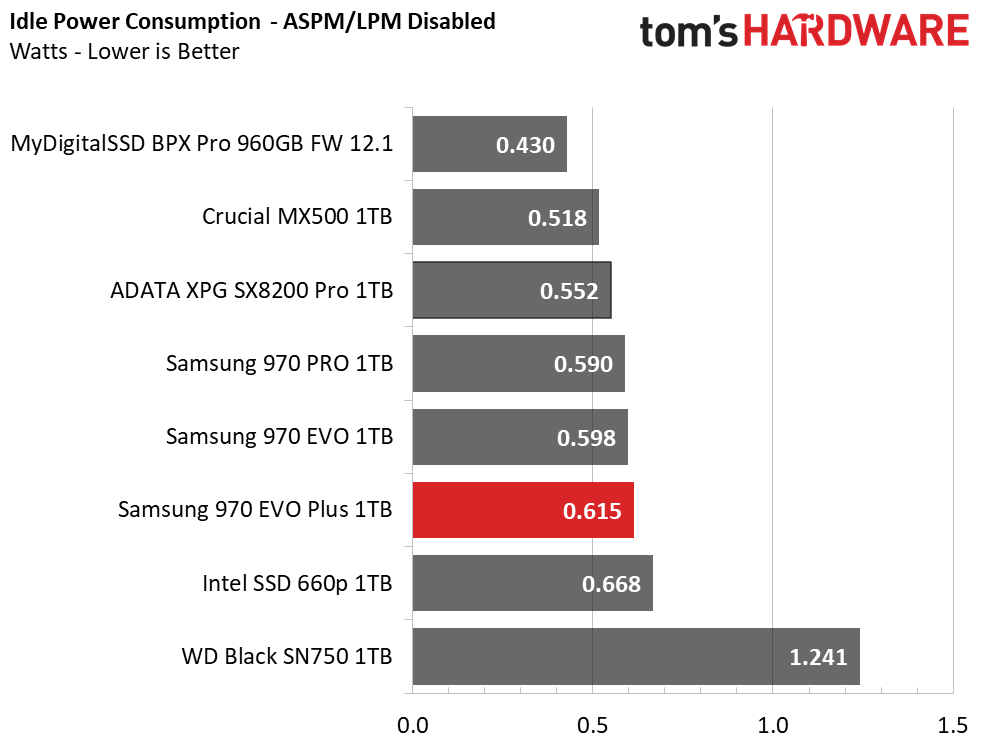
Like the 500GB model, Samsung’s 970 EVO Plus shows improved efficiency under load by half a watt, but idle consumption remains the same. Here, competitors are proving they have what it takes to close the gap. Overall, the 970 EVO Plus ranks sixth.
MORE: Best SSDs
MORE: How We Test HDDs And SSDs
MORE: All SSD Content
Current page: 1TB Performance Results
Prev Page 500GB Performance Results Next Page 2TB Performance Results
Sean is a Contributing Editor at Tom’s Hardware US, covering storage hardware.
-
Talwyn Wize I do wish you'd compared it to the 960, though, so we could see the improvement in comparison to its previous generation.Reply -
seanwebster Reply21702521 said:I do wish you'd compared it to the 960, though, so we could see the improvement in comparison to its previous generation.
21702550 said:And the 970 Pro.
Unfortunately, I do not have access to either. I did get to borrow a 1TB 970 PRO temporarily for testing, so that is included, but not the 512GB model. -
TCA_ChinChin I've heard from some other sources that it's faster than the 970 pro (in some cases?).Reply -
seanwebster Reply
Check out the 1TB charts on the third page of the review. In the 50GB copy and 6GB read tests, SYSmark, and game load test it out performs it.21702700 said:I've heard from some other sources that it's faster than the 970 pro (in some cases?).
As end products both the 970 EVO and EVO Plus feature the same exact endurance rating. They have been using TLC in the EVO line up for years now.21702858 said:So, Samsung too has switched to the lower-endurance TLC...
-
mac_angel I'm curious if they've made it compatible with PCIe gen 4 with a firmware upgrade. Little odd to be coming out with a PCIe gen3 product when the gen 4 was ratified last summer.Reply -
mdd1963 sticking with my 960 EVO for the life of the rig, as it is only 2 years old and counting...Reply -
ArmadaCas Does anyone know if this SAMSUNG 970 EVO PLUS (1TB) will run in an ASUS Z170 Pro Gaming with an i7 6700k..? The documentation for the mobo mentions M.2, but not NVME, so I'm kinda lost.Reply



